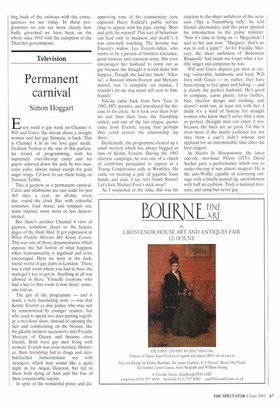Television
Permanent carnival
Simon Hoggart
Every week is gay week on Channel 4. Will and Grace, the sitcom about a straight woman and her gay flatmate, is back. This is Channel 4 in its 'we love gays' mode. Graham Norton is the star of this particular strand of programming, with his supremely over-the-top camp and his guests ushered down the aisle by two muscular jocks, almost naked except for gold angel wings. I'd love to see them bring on Norman Tebbit.
This is gayness as a permanent carnival. Cares and inhibitions are cast aside for just 365 days a year, an all-day, every day, round the clock Rio, with colourful costumes, loud music, and rampant sex, some implied, some more or less demonstrated.
But there's another Channel 4 view of gayness, somehow closer to the feature pages of the Daily Mail. It got expression in When Freddie Mercury Met Kenny Everett. This was one of those documentaries which exposes the full horror of what happens when homosexuality is legalised and even encouraged. Here we were in the dark, foetid world of gay clubs in London: 'There was a club room where you had to have the manager's key to get in. Anything at all was allowed in there. Virtually everyone who had a key to that room is now dead,' someone told us.
The gist of the programme — and it made a truly fascinating story — was that Kenny Everett (a disc jockey who may not be remembered by younger readers, but who used to spend two days putting together a two-hour show, instead of opening the Sun and commenting on the breasts, like his ghastly modern successors) met Freddie Mercury of Queen and became close friends. Both were gay men living with women: Everett was even married. However, their friendship led to drugs and alcohol-fuelled indiscriminate sex with strangers, which may sound like a quiet night in for Angus Deayton, but led to them both dying of Aids and the loss of their considerable talents.
In spite of the wonderful prissy and dis
approving tone of the commentary (you expected Harry Enfield's public service chap to appear with his pipe, saying: 'Boys and girls, be warned! This sort of behaviour can lead only to madness and death!') it was extremely touching. The heroine was Everett's widow, Lee Everett-Alkin, who seems to be a person of limitless tolerance, good humour and common sense. She even encouraged her husband to come out as gay because she thought it would make him happier. Though she had her limits: 'Nikolai', a Russian whom Everett and Mercury shared, was 'a complete sex maniac. I wouldn't let my dog stand still next to him, frankly.'
Nikolai came back from New Year in 1983, HIV positive, and introduced the disease to his circle. As it took over their bodies and then their lives, the friendship ended, and one of the last elegiac quotes came from Everett, saying that perhaps they could restore the relationship 'up there'.
Incidentally, the programme cleared up a small mystery which has always bugged us fans of Kenny Everett. During the 1983 election campaign, he was one of a clutch of celebrities persuaded to appear at a Young Conservative rally at Wembley. He came on wearing a pair of gigantic foam hands, and said, 'I say, let's bomb Russia! Let's kick Michael Foot's stick away!'
As I suspected at the time, this was his reaction to the sheer awfulness of the occasion ('like a Nuremberg rally', he told friends afterwards), and the press ignored his introduction to the prime minister: 'Now it's time to bring on — Megachick! I said to her just now. "Margaret, that's no way to roll a joint"!' As for Freddie Mercury, the sheer awfulness of 'Bohemian Rhapsody' had made me forget what a terrific singer and composer he was.
Will and Grace depicts gay men as caring, vulnerable, handsome and loyal. Will lives with Grace — or, rather, they have been trying to live apart and failing — and is clearly the perfect husband. He's good in company, earns plenty, loves clothes, hair, interior design and cooking, and doesn't want sex, at least not with her. I think it's a kind of fantasy for straight women who know they'll never find a man so perfect. Straight men can enjoy it too, because the lines are so good. I'd like it even more if the studio audience (or are they from a can?) didn't whoop and applaud for an interminable time after the best zingers.
In Murder In Mesopotamia, the latest one-off, two-hour Poirot (ITV) David Suchet gave a performance which was so under-the-top it was almost magical. He is the anti-Wolfit. capable of conveying outrage with a briefly pursed lip, astonishment with half an eyebrow. Truly a national treasure, and camp but never gay.






















































































 Previous page
Previous page